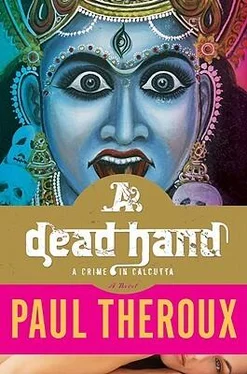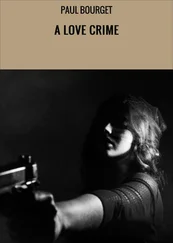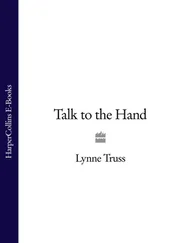"And she likes you too, Rajat."
"I fear she finds me loquacious," he said. "Even if we arrive together she won't suspect us of plotting."
This unexpected remark surprised me, because it seemed exactly what she might think: I had never arrived at the Lodge with him before. But that was at the periphery of my mind. I was concentrated on one thing, Mrs. Unger's vault: the perfumes, the lamps, her hands, her body slipping against the silk of her sari.
Rajat spoke sharply to the taxi driver.
The man threw up his hands. "Traffic. Too many traffic."
"Are you telling him to hurry?" I asked.
"Don't you want to see Ma?" he said.
I said nothing because I didn't want to be quoted; he seemed to be provoking me. He seemed odder, fussier in the taxi than he had seemed in the Hastings, not drinking his tea.
"Ah." He sighed with relief as the traffic began to move. I knew the feeling. I was relieved too as the taxi coursed through Alipore. I watched for the wall, the gateway, the fountain. Mrs. Unger, at the front door, turned abruptly at the sound of the taxi on the gravel driveway.
"Dear, dear boy," she said to Rajat, and to me, "I've been meaning to call you. You absolutely read my mind."
She embraced him, and at first he stiffened at her touch. Then she patted him and stroked his arms, and as she did so, he relaxed and sighed and surrendered.
"What have you boys been doing?" she asked, and when Rajat didn't answer, she said teasingly to him, "Madam has gone all silent."
Rajat seemed uneasy yet watchful, as he had in the taxi, glancing around, smiling in apprehension. We were standing at the top of the outer staircase, on the carved porch, with its plump balusters, the cracked and ornate entry, chunks of plaster missing from the stair treads, revealing old red brick beneath, like a deep gash, the same raw red, the whiteness surrounding it, like flesh, the Lodge like a noble wounded body.
"I didn't realize you had guests." This was spoken by a woman exiting the Lodge, who took me by surprise. She left the front entrance, taking a gingerly step that made her seem old, the chowkidar holding the door open, Balraj saluting. Now she approached Mrs. Unger.
"These are friends," Mrs. Unger said. "They're family."
The woman — thin, middle-aged, auntyish — was obviously American. She looked like a big insect, bug-eyed in large sunglasses, in an expensive, fitted summer dress. She frowned in the heat from beneath a wide-brimmed straw hat, dabbing her face with a hanky. Over her shoulder was slung a woven bag, not Indian but designer-stylish. She had thin, pale, bony arms and was brisk, in a hurry, in contrast to the child plodding next to her.
She held the hand of this dazed-looking girl in a starched dress and white ankle socks and black shoes — a classier version of the school uniform of the children at the Lodge. I smiled at her, and looking closer I thought I recognized the child. But all Mrs. Unger's children seemed memorable. They were unlike Indian children with parents; they were street children in a house, always seeming somewhat pent-up, trapped, and a little reckless, with searching eyes, tidy in simple uniforms.
This child was almost certainly the little girl who had ridden back to the house with us the day we'd visited the Kali temple and what Rajat had called "the monthly intake."
"I know your name," I said to the little girl. "I just can't think of it at the moment."
The woman said sharply, "We haven't got all day for you to think of it."
I smiled at her rudeness, then turned away. "What's your name, sweetie?" I asked the little girl. But she stepped sideways as though I was menacing her.
"Any more questions?" the woman said, her clumsy sarcasm snarling her delivery. She kept her mouth open, showing me her teeth.
Taken aback, I stared at her, wondering if I should give her a rude answer.
It was a hot afternoon. The woman seemed irritable and hurried. There was an air of confusion and distress that short-timers and foreigners had in Calcutta: a posture, a scowl of discomfort, of actual suffering. She had that look. I said nothing because Mrs. Unger was there, as always a calming presence.
But it was an odd scene: staring Rajat with somewhat triumphant glistening eyes, Mrs. Unger in a gorgeous sari, the cracked porch, the tense, offhand American woman in her big sunglasses with the spittle of "Any more questions?" on her lips, the stunned-looking child who I'd almost recognized, and the brittle echo of "Madam has gone all silent" directed at Rajat. And I was standing uneasily because I'd come unannounced. All of us on the broken stairs of the grand Lodge, and the noise of traffic outside the gate, the yelling children inside the house, the great strangling banyan tree with its roots showing everywhere, in some places seeming to tear the house apart and in other places holding the bricks together with the fingers and claws of its tangled roots.
"I'll be in touch," the woman said. She continued down the stairs and into a waiting car, one of those shiny new hotel cars with a logo on the door and curtained windows and an obsequious driver. The little girl, bewildered, glanced back at Mrs. Unger with a puzzled face.
"I know that kid," I said.
Mrs. Unger smiled. She didn't help me. She hadn't explained the woman or introduced us. Instead, as the car drew away, she sidled next to me and squeezed my arm.
"Charlie's in the office," Mrs. Unger said to Rajat. "He'll be thrilled to see you." After he left, she said to me, "I'm glad you came. I want to get my hands on you." She spoke in a low voice, her cheek on my shoulder. I got a whiff of her perfume, which was heavy, like a secretion of bodily warmth.
It was what I wanted to hear. I resisted kissing her. She seldom kissed, but I wanted badly to kiss her, to throw my arms around her for making me happy. I want to get my hands on you was a male fantasy — my fantasy anyway. It was what I needed, the mothering that had gotten me back to work on "A Dead Hand," a thinly fictionalized portrait of Mrs. Unger in Calcutta.
Children were playing in the outer rooms and some were singing nearby. The odors of cooking food, the slap of bare feet on the wooden floor, the high-pitched laughter. And then, as she shut the doors behind us, Mrs. Unger led me deeper into the house and down to the spa level, which smelled of incense, petals floating in the fountain, and in the damp leafy garden just outside, elephant-eared plants and trailing, gripping roots of the big banyan tree.
"I came to the house while you were away," I said. "I couldn't resist."
Although Mrs. Unger was the model of coolness and poise, I detected disapproval, a shrinking of her being.
"When you were in Mirzapur."
She laughed very hard at that. "I was nowhere near Mirzapur."
"It doesn't matter. I don't even know where it is."
"Neither do I," she said.
"I had a breakthrough with the Rajat mystery," I said. But the only reason I said that was to cover my surprise and somehow (so I thought) save her from embarrassment. I suspected, for the first time since I'd met her, that she was not telling me the truth. Yet she had spoken without any hesitation.
In her aromatic vault, on the table, she worked on me, but something in me refused to cooperate. I felt like clay. Doubt, misgiving, made my flesh inert. I wanted to give my whole being to her, yet a wariness kept me back. All the little hints, her not introducing me to the woman with the child, the woman's sharp retort, my recognizing the child and not remembering her name, Mrs. Unger not reminding me. She had been holding back.
I had never noticed this before, but then I had never visited unannounced. The suddenness produced this disharmony, and it probably hadn't helped that I'd arrived with Rajat. He had seemed to know something I didn't know. I had doubted him, and now I began to doubt myself.
Читать дальше












